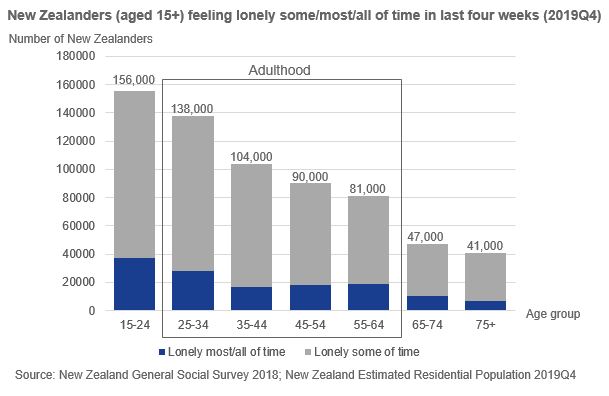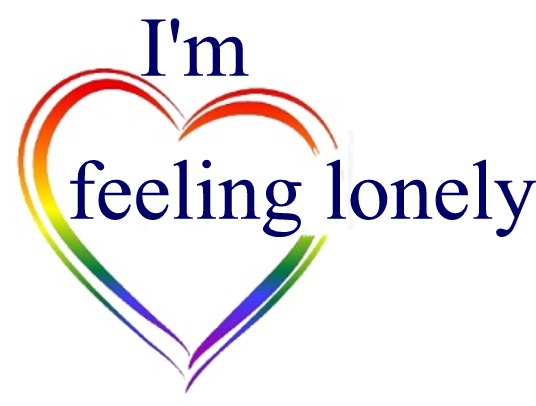Adulthood and lonely
When talking about adult loneliness the media typically has focussed its attention on the seniors (elderly adulthood) of our community….many of whom genuinely are lonely! The reality is that younger adults and midlife life adults all can – and do – face loneliness as they go through significant life changing situations. For some adults one event can create extreme loneliness, whereas for others it’s the accumulation of so many problems or perceived failures that brings on loneliness.
Adulthood is not easy, and it is often a lonely experience…regardless of whether you live alone or among an expanding family. It’s the time you might be facing your greatest relationship break-ups, or the greatest financial problems. As an adult you might be experiencing the greatest fear over your own and the mortality of others, as you see so many people around you critically ill, and dying….some of the hardest deaths being your parents and your own children. Your significance in the world changes…your best friends, and good colleagues, come and go… and you have perpetual change, beyond your ability to cope at times.
Our hearts do go to those of you in adulthood whose loneliness lingers and often becomes entrenched. What often makes it harder for you to get over your loneliness is that you feel you have to be responsible for yourself (the essence of being an adult)…and as a matter of pride you don’t seek help. Sometimes you do take “pithy advice” from well-meaning friends, magazines, website articles… and when that doesn’t work, you feel an even greater sense of loneliness…and often failure. One of the challenges of adulthood is understanding your uniqueness – that we are a product of our childhood experiences, our current and past support systems and our habitual patterns of thinking about ourselves and others. Advice that works for one isn’t necessarily going to work for all.
So if you are one of the many people who feels lonely as a result of being in adulthood, or you know of someone who feels loneliness from this, then read on. In fact even if you suspect others might be lonely, and they stoically say they aren’t, it’s worth understanding adulthood and loneliness better.

Scratching the surface of being lonely
Just as you might find it hard to understand how people in other life-stages might be lonely, it’s also hard for them to really grasp how very lonely you might be: what it’s like:
Feeling huge responsibility
... for the lives of children, spouses, and elderly parents.
Feeling a failure
... all your friends seem to have better lives.
Being scared
... with the possibility you will be next diagnosed with terminal illness.
Perpetually anxious
... no matter how hard you work you aren’t making headway.
Struggling
.... with life changing decisions.
Being an adult gives rise to many challenges with regard to feeling lonely…
… and in addition to these, you undoubtedly identify with many of the same loneliness problems that aren’t related to life-stage….
Prevalence of loneliness
In New Zealand, 413,000 adults aged 25-64 will have felt lonely some/most/all of the time in the last four weeks. This compares to 156,000 youth aged 15-24 and 88,000 seniors aged 65+.
So, if you are an adult aged 25-64 and are feeling lonely, you are not alone. In fact, being lonely during adulthood is quite normal. It peaks for adults in the 25-34 age group – sometimes called the ‘age of anxiety’ – when you have the pressures of travelling, finding a life partner, building a career, buying a house, and starting a family. The pressure and rejection of not achieving all these milestones can make you feel lonely.
And, through adulthood, there are many life events that can continue to make you feel lonely. So if you are an adult and feel lonely, we empathise with you.

Exposing loneliness
Feeling socially isolated occurs when people, like you, are not connected into their communities in a meaningful way. Society, other people and we ourselves unwittingly contribute to loneliness.

To name a few, loneliness resulting from being in adulthood might be exacerbated when:
- You feel significant pressure to have achieved more in your life by your current age, and you feel you are measuring short when comparing to others.
- You are socially shy and instead of only having people of a similar age and set of situations to engage with, you are struggling to engage with wide ranges of people all at different points in their lives.
- You lose emotional support from siblings in particular, and other family members or close friends.
- Your spouse or long term partner dies, and unexpectedly you have to transition to a life of living alone.
- You are juggling between looking after your children, your elderly parents and holding down a full-time job.
- You have been so hurt and disappointed by others that you start resenting people in general.
These are very real issues for you;
and some are not quick fixes! So despite these challenges it’s vital you actively find ways to ensure that you – and those around you – are emotionally healthy.
Exhibiting signs of being lonely
Solitude is very important for people to reflect and to come to grips with their situation. Being lonely for short periods is also not necessarily unhealthy. What we are considering is the type of loneliness which is prolonged and might be damaging to an individual’s health and wellbeing. Some people talk about their loneliness; other’s don’t; Some might not recognise that they are actually suffering from loneliness.
When people are already lonely, having people around you that you aren’t able to connect with on a deeper level, might even make your loneliness worse.
Research has shown that when socially isolated people aren’t getting enough regular human contact that can create problems with their family members and people who they do end up talking to.

- Avoiding people whose lives you see as more successful than yours.
- Withdrawing from sharing with your family as their pressures on you to have children, to buy a house, to get promotion become too much.
- Making little space to look after you own needs, putting everyone else first.
- Dwelling on the negative in life, and finding it hard to see the good.
- Hiding your feelings from your children and spouse… you don’t want them to know about the serious problem you have got yourself into.
- Giving up, and just withdrawing from anything that used to interest you.
These are just the surface of the ways you might be showing signs of being lonely… and that you could recognise in others.
So where to from here?
Conquering loneliness
We appreciate…
you all have a unique story.
How long you have been lonely; What you believe causes your particular loneliness; and what you have already tried to alleviate the loneliness.

To get to the heart of your loneliness we would like to get to know you!
Your personality, your eccentricities, and your values are all part of what makes you feel your loneliness more than some others.
Your next step
We appreciate the trust you would place in us to talk openly and frankly – so we promise no judgements – genuine empathy, respect and confidentiality.
Then when we have understood you better, we can help you move forward. Help you form better connections with your spread out communities, with your friends and your families… wherever they are in the world.
If you are ready to take the next step, click the button to get started addressing your loneliness:
People feel lonely for many reasons. To learn more about other working or studying and lonely categories, select one of the coloured boxes below, or scroll down the “I’m feeling lonely” menu.

With our help you can conquer your loneliness by taking better care of your inner self.
And we can conquer loneliness in New Zealand by better understanding and accepting each other.
So when you are ready…click here.
We look forward to hearing your view of the world!
